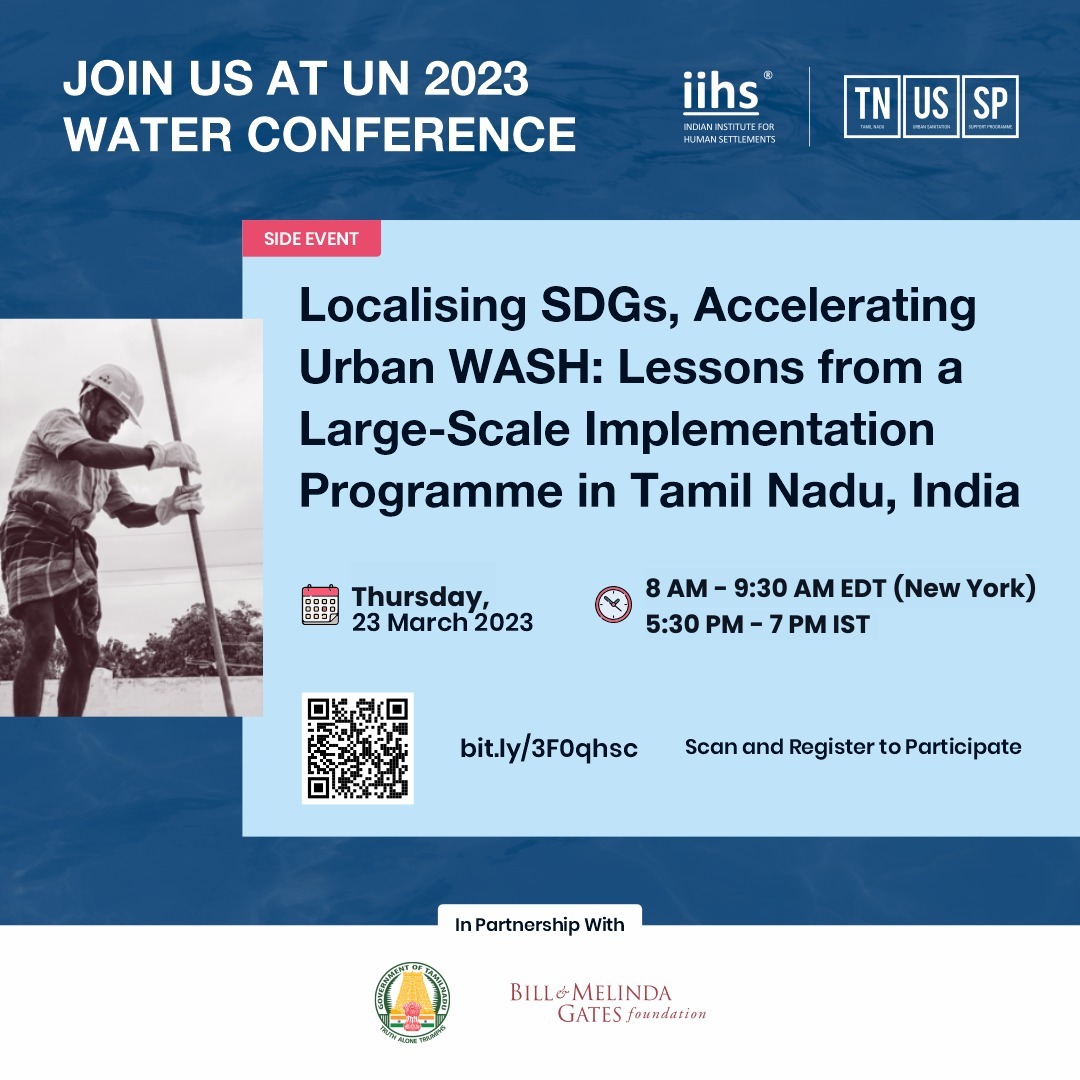The world is currently in the Water Action Decade 2018-2028. To further the Water Action Agenda, the United Nations organised the 2023 Water Conference between 22 and 24 March 2023 in New York, USA. The IIHS-led Tamil Nadu Urban Sanitation Programme hosted two virtual side events at the conference along with its partners.
Localising SDGs, Accelerating Urban WASH: Lessons from Tamil Nadu, India
23 March 2023, 8:00 to 9:30 AM EDT, Zoom
This side event highlighted lessons from the Tamil Nadu Urban Sanitation Support Programme (TNUSSP), one of the largest SDG 6 programmes, impacting over 16 million people across 200 towns in Tamil Nadu, India. Since 2016, TNUSSP has made interventions across the full cycle of sanitation, with a particular focus on enabling non-sewered sanitation and strengthening inclusive and sustainable sanitation services. Drawing from this experience, the session showcased the design, development, and implementation of unique context-based solutions with a view to accelerate access to total and inclusive sanitation.
The session began with a presentation by Roshan Shrestha, Deputy Director of Water, Sanitation and Hygiene at the Bill and Melinda Gates Foundation (BMGF), highlighting key challenges to accelerating access to sanitation, emphasising the disparities between and within countries, and on issues around equity and safety. He gave an account of BMGF’s approach to address some of these challenges and focused on the demonstration of technology and engagement approaches as a means to scale sanitation.
This was followed by a presentation by the TNUSSP team – Kavita Wankhade, Project Director-TNUSSP; Santhosh Ragavan, Team Leader-TNUSSP; Niladri Chakraborti, Team Leader-CWIS; and Mahima Vijendra, Specialist-TNUSSP. The presentation highlighted the experience of designing, developing, and implementing unique context-based solutions for total and inclusive sanitation.

The Q&A session began with reflections from Pete Kolsky, Professor Emeritus Department of Environmental Sciences and Engineering, University of North Carolina, on the general principles around the process of scaling sanitation; and Ravikumar Joseph, an environmental engineer with 30 years of experience in the urban water and sanitation sector, and has previously worked at the World Bank, spoke about addressing challenges associated with financing sanitation.
The commitment statement titled “Accelerating Access to and Sustainable Management of WASH “ was adopted by IIHS, which seeks to mainstream different forms of sanitation and context-based approaches that deliver safe, sustainable and inclusive sanitation for all and now. Looking beyond provisioning and towards sustainability of services, IIHS’ commitment focuses on the need for investment, capacity development and institutional change to focus on the operation and maintenance of WASH systems. The commitment seeks to enable the implementation of technological, institutional, social and financial innovations that have been demonstrated at scale.
Key Issues Discussed
- “All sanitation is local”, which is why it requires context-specific solutions.
- A paradigm shift is required in approach; bringing forward sanitation as a service, including non-sewered sanitation, while moving away from the singular pursuit of sewered sanitation and sanitation as infrastructure.
- The approaches must build on strengths and address challenges along the full cycle of sanitation while enabling optimal utilisation of resources.
- There are challenges in accelerating access to sanitation due to the disparities between and within countries. Lack of equity in accessing sanitation services requires a deeper focus on inclusive sanitation.
- Demonstrating innovative technologies and engagement approaches with multiple stakeholders can be a means for scaling sanitation.
- Enabling sanitation service delivery entails buy-in from and coordination with several government agencies.
Key Recommendations for Action
- Delivering context-based solutions that are an appropriate mix of networked and non-networked, and centralised and decentralised systems, ensuring inclusive and immediate access to safe and sustainable sanitation.
- Recognising the full chain of sanitation while developing the strategy to scale sanitation; and considering not just infrastructure but also processes, services and stakeholders at each stage.
- Leveraging strengths to improve sanitation service provision and strengthening system functions to ensure sustained service delivery.
- Focusing on sanitation services and ensuring sustainability through investment, capacity development and institutional change.
- Learning from experiences of other geographies, both successes and failures included, and through the transfer of social, institutional, technological and financial innovations.

In Partnership With


For further queries, contact Mahima V at

